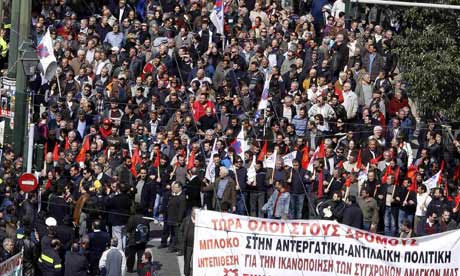
The debt crisis has provoked many demonstrations in the capital Athens. Photograph: YIORGOS KARAHALIS/REUTERS
Greece's economic recovery will be rockier and more painful than anticipated – with slow growth rates and a steep rise in unemployment – as recession in the debt-choked country deepens, according to the International Monetary Fund.
The bleak assessment, on the eve of the first instalment by the Washington-based body of a multimillion-euro bailout to Athens, underscores the concerns about the IMF-EU sponsored program.
Although the IMF helped draw up the accord under which emergency loans of up to €110bn will be disbursed to Greece until 2013, there are several risks that could scupper the rescue plan.
Greeks could find themselves fending off bankruptcy again if reforms to improve productivity and the nation's unusually low competitiveness are not enacted quickly.
"[Success] hinges on deep and comprehensive structural reforms," said the report, drafted by an IMF delegation which visited Athens on a two-week fact-finding mission before the deal was reached.
"Without such reforms, Greece would not restore competitiveness or growth, and real incomes will remain stagnant and unemployment high and the debt burden would eventually prove unsustainable," it concluded.
While praising Prime Minister George Papandreou's six-month-old government for its bold fiscal policies, the assessment questioned the administration's ability to enforce draconian austerity measures in return for the loans.
There was, it said, "an undeniably high" danger that the program could become unstuck if the ruling socialists gave in to widespread public hostility over the €30bn spending cuts and tax hikes.
Greek unions have vowed to step up action against the government's latest reform – the overhaul of the pension system that is key to the IMF agreement – with street protests and a general strike on 20 May.
"The IMF will not stop thirsting for workers' blood," said Yannis Panagopoulos, who heads the country's biggest union, GSEE.
The eurozone's weakest link, Greece is currently tackling a public deficit of 13.6% – the highest in the EU – and debts of €300bn.
But the fiscal indicators are likely to worsen before they get better. As a result of the cost-cutting measures foreseen in the rescue package, the IMF predicted that recession would deepen, with Athens' debt-to-GDP ratio reaching 176% in the "worst-case scenario".
The vicious cycle could mean yet more money being poured into the banking sector – to prevent its collapse – a move that would see Greece's public debt increasing further.
No comments:
Post a Comment